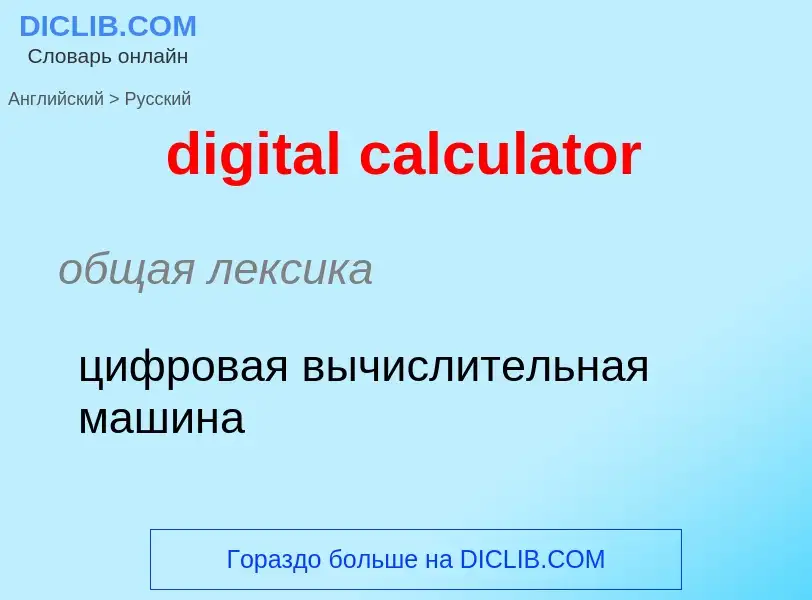Traducción y análisis de palabras por inteligencia artificial
En esta página puede obtener un análisis detallado de una palabra o frase, producido utilizando la mejor tecnología de inteligencia artificial hasta la fecha:
- cómo se usa la palabra
- frecuencia de uso
- se utiliza con más frecuencia en el habla oral o escrita
- opciones de traducción
- ejemplos de uso (varias frases con traducción)
- etimología
digital calculator - traducción al ruso
общая лексика
цифровая вычислительная машина
2) счётная машина; вычислительное устройство
3) портативная клавишная счётная машина
Definición
Wikipedia

An electronic calculator is typically a portable electronic device used to perform calculations, ranging from basic arithmetic to complex mathematics.
The first solid-state electronic calculator was created in the early 1960s. Pocket-sized devices became available in the 1970s, especially after the Intel 4004, the first microprocessor, was developed by Intel for the Japanese calculator company Busicom.
Modern electronic calculators vary from cheap, give-away, credit-card-sized models to sturdy desktop models with built-in printers. They became popular in the mid-1970s as the incorporation of integrated circuits reduced their size and cost. By the end of that decade, prices had dropped to the point where a basic calculator was affordable to most and they became common in schools.
Computer operating systems as far back as early Unix have included interactive calculator programs such as dc and hoc, and interactive BASIC could be used to do calculations on most 1970s and 1980s home computers. Calculator functions are included in most smartphones, tablets and personal digital assistant (PDA) type devices.
In addition to general purpose calculators, there are those designed for specific markets. For example, there are scientific calculators which include trigonometric and statistical calculations. Some calculators even have the ability to do computer algebra. Graphing calculators can be used to graph functions defined on the real line, or higher-dimensional Euclidean space. As of 2016, basic calculators cost little, but scientific and graphing models tend to cost more.
With the very wide availability of smartphones and the like, dedicated hardware calculators, while still widely used, are less common than they once were. In 1986, calculators still represented an estimated 41% of the world's general-purpose hardware capacity to compute information. By 2007, this had diminished to less than 0.05%.



![Braun]] (1987) Braun]] (1987)](https://commons.wikimedia.org/wiki/Special:FilePath/Braun 4856 solar card calculator, 2.jpg?width=200)

![A modern scientific calculator with a [[LCD]] A modern scientific calculator with a [[LCD]]](https://commons.wikimedia.org/wiki/Special:FilePath/Casio fx-991EX.png?width=200)

![The Bulgarian [[ELKA 22]] from 1967 The Bulgarian [[ELKA 22]] from 1967](https://commons.wikimedia.org/wiki/Special:FilePath/Elka-22 (I197211).png?width=200)

![The [[HP-65]], the first programmable pocket calculator (1974) The [[HP-65]], the first programmable pocket calculator (1974)](https://commons.wikimedia.org/wiki/Special:FilePath/HP-65 white background.jpg?width=200)

![The Italian [[Programma 101]], an early commercial programmable calculator produced by [[Olivetti]] in 1964 The Italian [[Programma 101]], an early commercial programmable calculator produced by [[Olivetti]] in 1964](https://commons.wikimedia.org/wiki/Special:FilePath/Olivetti Programma 101 - Museo scienza e tecnologia Milano.jpg?width=200)




![Adler 81S pocket calculator with [[vacuum fluorescent display]] (VFD) from the mid-1970s. Adler 81S pocket calculator with [[vacuum fluorescent display]] (VFD) from the mid-1970s.](https://commons.wikimedia.org/wiki/Special:FilePath/Calculator Adler 81S.jpg?width=200)

![The 1972 [[Sinclair Executive]] pocket calculator. The 1972 [[Sinclair Executive]] pocket calculator.](https://commons.wikimedia.org/wiki/Special:FilePath/SinclairExecutive-01.jpg?width=200)
![The [[HP-35]], the world's first scientific pocket calculator by Hewlett Packard (1972). The [[HP-35]], the world's first scientific pocket calculator by Hewlett Packard (1972).](https://commons.wikimedia.org/wiki/Special:FilePath/Hp-35 1972.jpg?width=200)

![The interior of a Casio fx-20 scientific calculator from the mid-1970s, using a VFD. The processor integrated circuit (IC) is made by [[NEC]] (marked μPD978C). Discrete electronic components like [[capacitor]]s and [[resistor]]s and the IC are mounted on a [[printed circuit board]] (PCB). This calculator uses a battery pack as a power source. The interior of a Casio fx-20 scientific calculator from the mid-1970s, using a VFD. The processor integrated circuit (IC) is made by [[NEC]] (marked μPD978C). Discrete electronic components like [[capacitor]]s and [[resistor]]s and the IC are mounted on a [[printed circuit board]] (PCB). This calculator uses a battery pack as a power source.](https://commons.wikimedia.org/wiki/Special:FilePath/CasioFX20-inside.jpg?width=200)
![The processor chip (integrated circuit package) inside a 1980s Sharp pocket calculator, marked SC6762 1•H. An LCD is directly under the chip. This was a PCB-less design. No discrete components are used. The battery compartment at the top can hold two [[button cell]]s. The processor chip (integrated circuit package) inside a 1980s Sharp pocket calculator, marked SC6762 1•H. An LCD is directly under the chip. This was a PCB-less design. No discrete components are used. The battery compartment at the top can hold two [[button cell]]s.](https://commons.wikimedia.org/wiki/Special:FilePath/Sharp el-323 ic 1ae.jpg?width=200)
![2000}}) pocket calculator. It uses a button battery in combination with a solar cell. The processor is a "Chip on Board" type, covered with dark [[epoxy]]. 2000}}) pocket calculator. It uses a button battery in combination with a solar cell. The processor is a "Chip on Board" type, covered with dark [[epoxy]].](https://commons.wikimedia.org/wiki/Special:FilePath/Citizen se-733 int 1ac.jpg?width=200)
